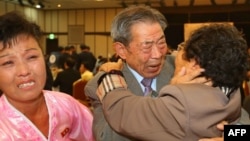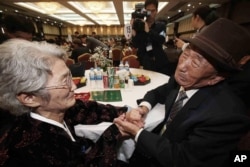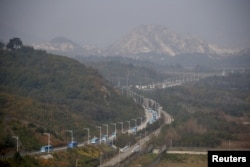The long awaited reunions of Korean separated families got underway Tuesday as the first group of mostly elderly participants from the South crossed into the North in a caravan of buses.
"I feel really thrilled and happy. I just couldn't sleep until 2 a.m. I am 77 years old and my brother is 83 years old. I want to see him, I want to see him right away,” said South Korean Oh Cheol-Hwan, who will meet her older brother in North Korea.
The participants have been organized into two groups of approximately the same size that will each hold three days of reunions at the Kumgang Mountain resort just north of the inter-Korean border on the western side of the peninsula.
First group, first day
The first group, which arrived in Kumgang Tuesday, is made up of more than 390 participants and family members from the South Korean side and about 140 from the North, according to Seoul’s Unification Ministry.
International media access to the North Korean reunion site is not permitted. But a South Korean group of journalists has been allowed to shoot selected footage of the event with other news organizations.
The 1950-53 Korean War between the communist North and now democratic South displaced millions of people and separated families when the country was divided.
An estimated 60,000 South Koreans are on a waiting list to participate in separated family reunions.
Shim Gu-seop, a representative from the Inter-Korean Separated Family Association, said Tuesday's family reunion is a positive step, but added the relatively small number who so far have been permitted to join in the 20 inter-Korean reunions held since 2000 is a tragedy.
“I sincerely hope more divided families get united, not just the hundreds of family members like this time, so that they can resolve their deep sorrow. I feel heavy with worry as the number of people being united is so few,” Shim said.
No direct contact
For the most part, families on either side of the border have long been forbidden to exchange phone calls or letters directly with one another.
"I can't think of what to say. We are being reunited after 65 years, when I was 11. I want to ask if he can recognize me,” said 76-year-old South Korean Kim Ki-Joo, who will meet his older brother in North Korea.
This year’s reunion is only the second in the past five years. It came about as part of an agreement reached in August to ease tensions after a landmine border incident nearly escalated into a large-scale military conflict.
Shim and other advocates from the Inter-Korean Separated Family Association hope this event will lead to more information sharing and inter-Korean family contact, not just these small, orchestrated family reunions.
“I hope two Koreas confirm status of 10,000 or 20,000 divided families under a plan through high-level talks, and let them exchange letters and meet each other through a TV screen,” he said.
The reunions were suspended in 2010 after North Korea fired artillery shells at a South Korean border island, and Pyongyang canceled reunions planned in 2013 at the last minute after claiming Seoul was trying to overthrow North Korea's government.
Youmi Kim contributed to this report.














